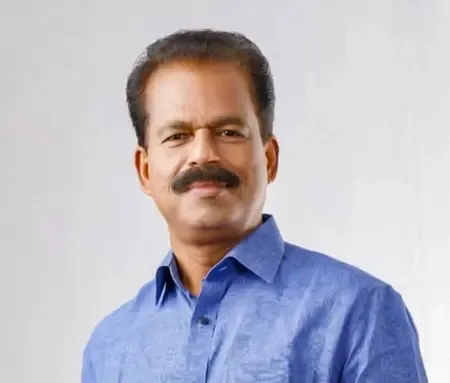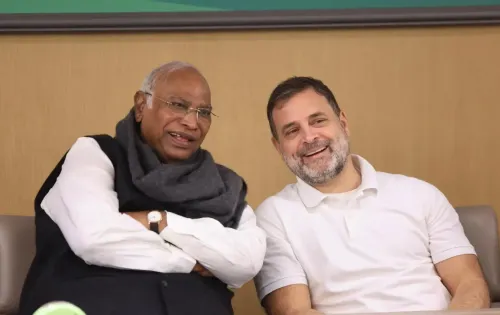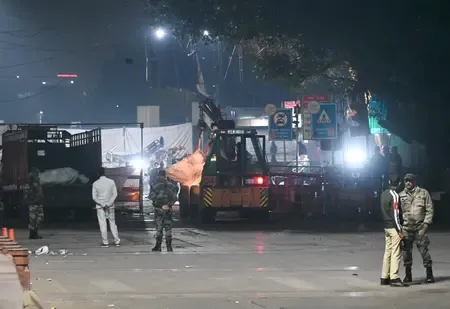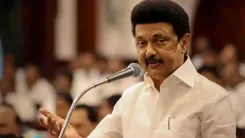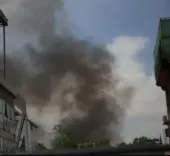Has the Naga Apex Body Really Suspended the Indefinite 'Trade Embargo'?
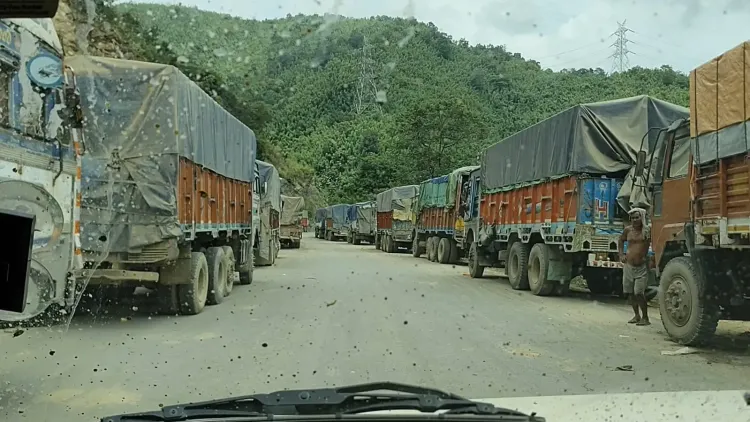
Synopsis
Key Takeaways
- The United Naga Council has temporarily suspended its Trade Embargo.
- The suspension follows assurances from the Manipur government regarding tripartite talks.
- Concerns regarding border fencing and the Free Movement Regime remain significant.
- The UNC appreciates the support from various organizations and the Naga public.
- This situation highlights the ongoing struggle for cultural and territorial rights in the region.
Imphal, Sep 11 (NationPress) The United Naga Council (UNC) in Manipur has declared a temporary halt to its “Trade Embargo” following assurances from the state government that tripartite negotiations will recommence regarding the issues surrounding India-Myanmar border fencing and the abolition of the Free Movement Regime (FMR).
The apex representative body of the Naga community, the UNC, along with other Naga groups, initiated the indefinite “Trade Embargo” in regions populated by Naga people starting at midnight on September 8. This action was taken in protest against the fencing along the international border with Myanmar and the discontinuation of the FMR.
As stated by UNC’s Publicity and Information Secretary H. James Hau, the decision to suspend the Trade Embargo came after the Manipur government sent a letter indicating the resumption of a tripartite meeting involving the UNC, the Ministry of Home Affairs (MHA), and the Manipur government. This meeting aims to address the revocation of the FMR and the border fencing along the “imaginary India-Myanmar border in Naga territories.” An Emergency Presidential Council (EPC) meeting was convened on Thursday to discuss these developments.
The EPC expressed appreciation for the Manipur government’s recognition of the UNC's previous engagements with the MHA and their acknowledgment of the received memoranda concerning these contentious issues, Hau mentioned in a statement.
The UNC’s statement highlighted that the assurance from the Manipur government regarding prior consultation with the UNC and other stakeholders before commencing fencing activities was positively received during the EPC meeting.
During the Thursday meeting at Tahamzam in the Senapati district, the Presidential Council of the UNC resolved to temporarily suspend the ongoing “Trade Embargo” in Naga-populated areas starting at 6 p.m. on Thursday.
Furthermore, the UNC expressed gratitude to all tribes, women, student, and youth organizations, as well as the Naga public for their unwavering support during the effective enforcement of the Trade Embargo.
Earlier on the same day, a senior official indicated that Manipur Chief Secretary Puneet Kumar Goel had written to UNC President Ng. Lorho on Wednesday, urging the withdrawal of protests for the greater public good, while discussions continued between the MHA and Naga organizations.
In the letter to the UNC President, the Chief Secretary stated: “The MHA has been in dialogue with the UNC regarding the border fencing in areas inhabited by Naga communities. The state government has acknowledged your memoranda on this matter.”
“It is important to inform you that the Central government has noted the concerns raised by the UNC and other stakeholders. Consequently, the Central government will continue to engage in discussions with the UNC and other parties for prior consultation before fencing activities commence. The next tripartite meeting with the UNC will be scheduled at a mutually agreeable time and place,” the letter stated.
Meanwhile, officials from the MHA and leaders of three Naga organizations, including the UNC, conducted a meeting in Delhi on August 26, but the discussions regarding the reinstatement of the previous FMR and halting the ongoing border fencing remained inconclusive.
The UNC had previously issued an ultimatum to the Central government and met with Manipur Governor Ajay Kumar Bhalla on August 16 to discuss the reinstatement of the old FMR and the cessation of border fencing along the 398 km stretch of the India-Myanmar border.
Since last year, the UNC and other Naga groups have been actively protesting against the unilateral abrogation of the FMR and the construction of border fencing along the India-Myanmar border.
The enforcement of the Trade Embargo and the halt on goods-laden vehicles have severely disrupted the supply of essentials and foodgrains to this Northeastern state since Monday.
Naga organizations assert that the government's decision to fence the border and abolish the FMR would physically divide Naga tribes residing in Manipur, Nagaland, Arunachal Pradesh, and Myanmar, jeopardizing their cultural identity and traditional ties.
Last year, the MHA announced the discontinuation of the FMR, which previously permitted residents along the India-Myanmar border to traverse 16 km into each other's territories without needing a passport or visa.
Instead, the MHA opted for a new scheme to issue passes to border residents on both sides of the frontier living within 10 km, aiming to regulate cross-border movements.
The governments of Nagaland and Mizoram, along with numerous political parties and civil societies in these northeastern states, have vehemently opposed both the border fencing and the repeal of the old FMR.
Four northeastern states—Arunachal Pradesh, Manipur, Nagaland, and Mizoram—share a 1,643-km unfenced boundary with Myanmar.
The MHA had previously planned to erect fencing along the entire porous border, known for smuggling arms, ammunition, narcotics, and other contraband, at an estimated cost of Rs 31,000 crore.



